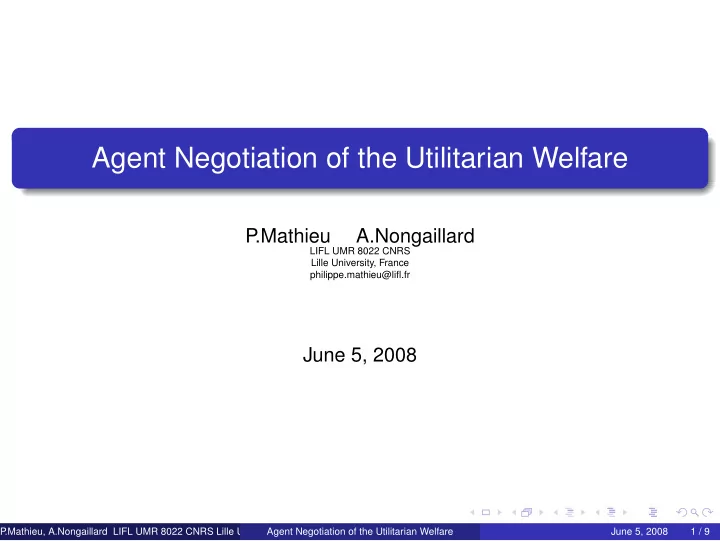

Agent Negotiation of the Utilitarian Welfare P .Mathieu A.Nongaillard LIFL UMR 8022 CNRS Lille University, France philippe.mathieu@lifl.fr June 5, 2008 P .Mathieu, A.Nongaillard LIFL UMR 8022 CNRS Lille University, France philippe.mathieu@lifl.fr () Agent Negotiation of the Utilitarian Welfare June 5, 2008 1 / 9
Assumptions The negotiation process is based on a contact network: complete, regular, random or small-world. An agent is able to negotiate with a restricted number of neighbors. The nature of the resources involved: discrete, not shareable, not divisible and static no compensatory payments decision-making of each agent based on local information: agents are able to report preferences to their neighbors only. No global information. preferences expressed by means of k -additive utility functions two criteria used: rationality and sociality. P .Mathieu, A.Nongaillard LIFL UMR 8022 CNRS Lille University, France philippe.mathieu@lifl.fr () Agent Negotiation of the Utilitarian Welfare June 5, 2008 2 / 9
Evaluation The transaction that are allowed in the negotiation process: the social gift the rational swap the social swap the rational cluster-swap the social cluster-swap The evaluation of the negotiation process is based on various criteria: number of performed transactions number of exchanged resources number of speech turns number of attempted transactions We differenciate two types of optimum: the global optimum and the T -global optimum. Thus, the social value associated with the resource allocation on which the negotiation process ends is compared with the optimal one. P .Mathieu, A.Nongaillard LIFL UMR 8022 CNRS Lille University, France philippe.mathieu@lifl.fr () Agent Negotiation of the Utilitarian Welfare June 5, 2008 3 / 9
Results Table: Gap(%) due to the different transactions on a complete contact network Social Rational n-m Gift Swap CS Swap CS 50-500 0 0.94 0.96 2.15 6.71 100-1000 0 0.76 0.76 1.53 4.9 150-1500 0 0.65 0.71 1.31 3.9 200-2000 0 0.56 0.60 1.15 2.5 Table: Gap(%) due to the different transactions on a random contact network Social Rational n-m Gift Swap CS Swap CS 50-500 1.3 3.41 3.4 6.05 5.88 100-1000 0.73 1.88 1.72 3.63 3.59 150-1500 0.43 1.3 1.35 2.69 2.42 200-2000 0.31 1.22 1.02 2.3 2.05 P .Mathieu, A.Nongaillard LIFL UMR 8022 CNRS Lille University, France philippe.mathieu@lifl.fr () Agent Negotiation of the Utilitarian Welfare June 5, 2008 4 / 9
Comparison of Transaction Types P .Mathieu, A.Nongaillard LIFL UMR 8022 CNRS Lille University, France philippe.mathieu@lifl.fr () Agent Negotiation of the Utilitarian Welfare June 5, 2008 5 / 9
Behavior Variant If the agent initiator and the selected neighbor find an acceptable transaction, it is then performed otherwise three different tasks can be done for the agent initiator: abort the negotiation 1 choose another resource with the same neighbor 2 choose another neighbor with the same resource 3 Based on this task set, four different behaviors can be defined. After the identification of an acceptable deal or the end of the negotiation, a new initiator is randomly chosen. Table: Social gap comparison of the behaviors n-m A B C D 50-500 1.2% 0% 1.1% 0% 100-1000 0.5% 0% 0.5% 0% 150-1500 0.3% 0% 0.3% 0% 200-2000 0.2% 0% 0.2% 0% P .Mathieu, A.Nongaillard LIFL UMR 8022 CNRS Lille University, France philippe.mathieu@lifl.fr () Agent Negotiation of the Utilitarian Welfare June 5, 2008 6 / 9
Behavior Variant Impact P .Mathieu, A.Nongaillard LIFL UMR 8022 CNRS Lille University, France philippe.mathieu@lifl.fr () Agent Negotiation of the Utilitarian Welfare June 5, 2008 7 / 9
Simulation P .Mathieu, A.Nongaillard LIFL UMR 8022 CNRS Lille University, France philippe.mathieu@lifl.fr () Agent Negotiation of the Utilitarian Welfare June 5, 2008 8 / 9
Optimal Social Value Determination The linear programs is based on the variables x ra : � 1 if the agent a owns the resource r x ra = 0 otherwise max � � u a ( r ) x ra a ∈A r ∈R sw ⋆ u = subject to: � x ra = 1 a ∈A It is also possible to determine the best rational resource allocation by adding a simple set of constraints: � u a ( r ) x ra ≥ u init a ∈ A a r ∈R P .Mathieu, A.Nongaillard LIFL UMR 8022 CNRS Lille University, France philippe.mathieu@lifl.fr () Agent Negotiation of the Utilitarian Welfare June 5, 2008 9 / 9
Recommend
More recommend